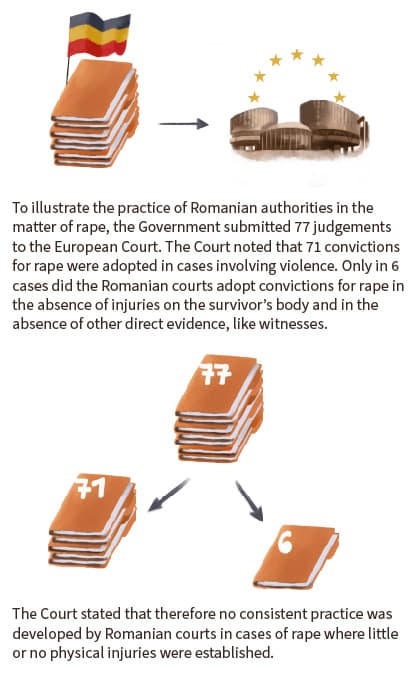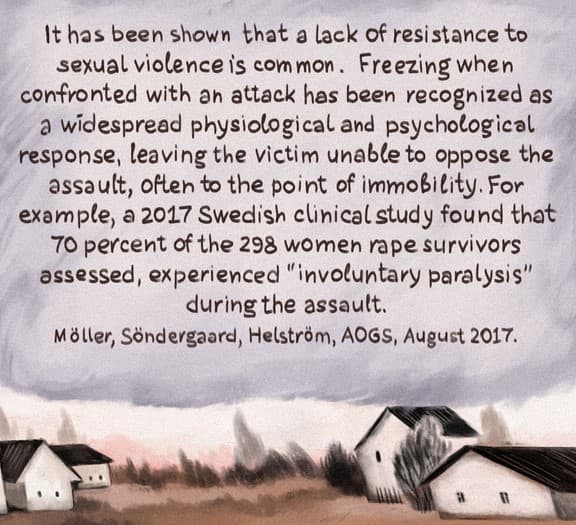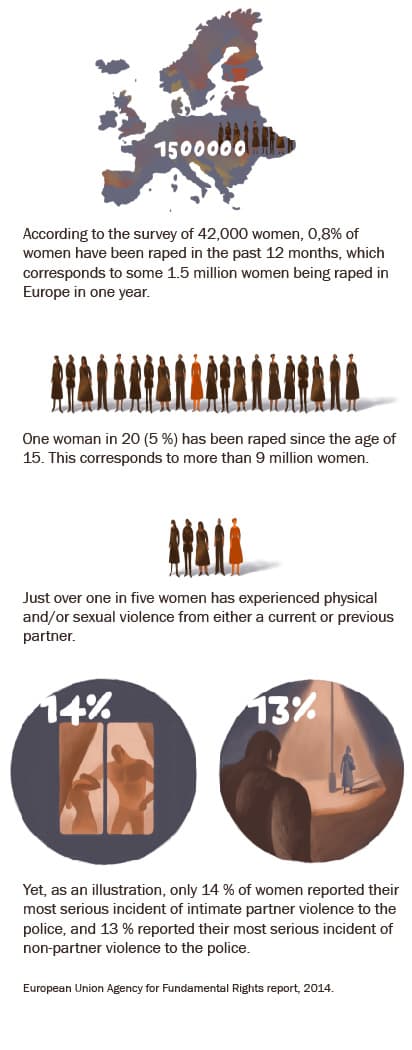In the case E.B. against Romania (2019), the European Court of Human Rights considered the complaint of a woman known as E. for reasons of anonymity. Find out how rape is a form of torture and other ill-treatment.
In the case E.B. against Romania (2019), the European Court of Human Rights considered the complaint of a woman known as E. for reasons of anonymity. Find out how rape is a form of torture and other ill-treatment.
How is rape connected to the right to be free from torture and other ill-treatment?
To complete the task, click on all hotspots and explore 7 reasons for refusal. Put a tick if you consider the reason to be unjustified and violating the right to peaceful assembly. For a closer look at each situation, drag and move the panorama. You have two attempts.’
Torture is when a person is intentionally caused severe pain or suffering for a specific purpose or as the result of discrimination. The specific purpose must be either to get information or a confession, to punish or to intimidate. In order to be considered torture there needs to be an involvement of an official, such as a policeperson or prison guard. However, this doesn’t need to be direct – this means they don’t need to perpetrate the act of torture or other ill-treatment themselves. It is enough that they knowingly let it happen.
Sometimes a person is harmed without all the elements of torture being present. For example, where the purpose of causing pain or suffering is not one of the reasons above. In such cases, the harm will not be torture but still ill-treatment (sometimes referred to as ‘other cruel, inhuman and degrading treatment and punishment’).
States have negative and positive obligations to safeguard our human right to be free from torture and other ill-treatment.
The negative obligation means the state must not do something. For instance, public officials must not inflict torture and other ill-treatment, such as rape, on individuals.
The positive obligation requires action from the state. For example,
• states must put in place adequate legislation that effectively protects individuals from rape and other sexual violence;
• also, states must apply this legislation in practice through effective investigation and, where appropriate, prosecution, for all acts of rape or other sexual violence and provide protection to the victims.
Putting it simply, the failure of effectively investigating rape allegations amounts to a violation of the right to be free from torture and other ill-treatment by the state.
The states bear this positive duty to carry out effective investigation of all rape-related cases whether the perpetrator is an agent of the state, a violent partner or spouse or a total stranger.
Now, let’s find out what exactly happened to E. in May 2008.
Does this case concern negative or positive obligations of the state to protect individuals from torture and other ill-treatment?
Correct answer: The survivor did not claim that she had been raped by state officials, so it is not about the state refraining from inflicting torture or other ill-treatment. In this case, the European Court was considering if Romania fulfilled its positive obligations to protect E. as a vulnerable individual from rape or other sexual violence. The court was looking specifically into the effectiveness of investigation and prosecution under the right to be free from torture and other ill-treatment, and the right to private life.
Wrong answer! Try again!
So, what went wrong during the investigation?
E. went straight to the police to report the crime, but the station was closed. The next day E. went to the police again and lodged a complaint. At first, the police advised her to withdraw the complaint because there were no witnesses. They said she was “asking for it” and “it did her good”. She refused to withdraw, and the investigation began.
Let’s study what happened to E. again, but this time – through the lens of Romanian authorities. What important facts did they choose to ignore in E’s testimony?
What important facts did the Romanian authorities choose to ignore?
(All of the above) Yes, all these facts from E’s testimony were ignored by authorities when they tried to establish if the intercourse was consensual or not.
The police did not take E’s testimony seriously. They did not investigate both E’s and T’s personal profiles, overlooking her psychiatric diagnosis that makes her a person from a vulnerable group requiring increased protection; and not giving any importance to T. having a conviction for rape previously. The circumstances in which the incident took place – in the evening, in the proximity of the cemetery – were also not considered. All these would have been crucial in investigating if E. gave free and genuine consent to having sex with T.
Instead of investigating, the police at first responded by demeaning her and insisting she should withdraw the complaint and saying, “she was asking for it” and “it did her good”. Then they focused on looking for the proof of physical resistance. The Prosecutor’s Office decided not to open criminal proceedings stating E. had not asked for help, that there were no injuries in her genital areas, and that although there were bruises on her arm it was unclear when these occurred. The court in Romania ultimately agreed with the Prosecution, and E. had to complain to the European Court of Human Rights in Strasbourg.
Wrong answer! Try again!
So, how should consent have been established?
In this case, the woman said NO but T. still violated her sexual autonomy and raped her. But even absence of a NO of victims doesn’t mean they give consent and looking for a NO is not enough to establish the fact of rape in 100% of cases.
Let’s chat to an international human rights lawyer to find out more about E’s situation and the role of consent.



Now, let’s check how well you have done through the module!
Mark if the following statement is True or False:
The failure of effectively investigating rape allegations amounts to a violation of the right to be free from torture and other ill-treatment by the state.
Answer is correct!
Wrong answer! Try again!
Read the question and choose the correct answer:
What should be the key element in the effective investigation of rape-related cases according to international human rights law and standards?
Answer is correct!
Wrong answer! Try again!



Your choice regarding cookies on this site We have placed cookies on your device to help make this website better. You can use this tool to change your cookie settings. Otherwise, we'll assume you're OK to continue.
